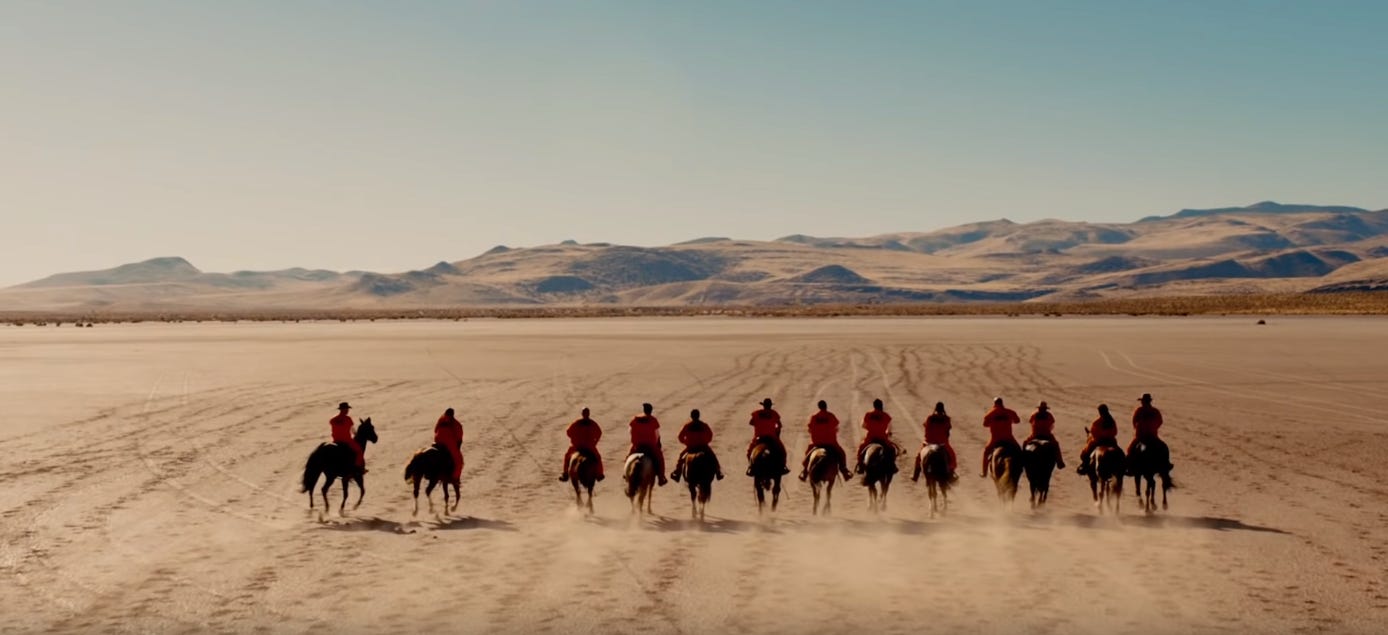The Mustang

This film might be the closest I ever come to understanding people with crazy horse obsessions. (Don't lie to yourself; you know one of these people.)
In all seriousness, The Mustang is a modest but emotionally effectual meditation on the harsher, more dangerous side of traditional views of masculinity, and the processes some men have to undergo in order to become in touch with their own emotions and those of their loved ones.
The story follows Colman Roman (Matthias Schoenaerts), a federal prisoner convicted of murder who serves his time shoveling horse droppings for the rehabilitation program that sees inmates training wild mustangs for auction as a fundraiser for the prison system. Colman is a quiet man on the surface, but clearly boiling over with anger under the surface—anger at himself and at the world around him. Mostly, Colman just wants to be left alone, and he bristles at the counseling of his stern but well-meaning psychologist (Connie Britton). When Myles, the prickly head of the horse training program (played by a lovably crusty Bruce Dern), takes a liking the Colman, he insists that Colman become a horse trainer in the rehab program. Colman is skeptical at first, as he is of everything, but soon becomes fascinated by the concept of trying to make his horse trust him. It's an obvious but no less poetic parallel between Colman and his horse: two aggressive souls, confined to the prison compound, learning to trust one another with their vulnerabilities—of course, the obvious difference being that Colman deserved to be put in prison, unlike his counterpart, imprisoned for no wrongdoing of his own.
Director Laure de Clermont-Tonnerre chooses to capture Colman's internal and external struggles with suffocatingly tight closeups and imperfect framing of interior shots, emphasizing Colman's own lack of control and purpose. These tight shots are interspersed with gorgeous panoramas of the sweeping Texas (I presume) countryside, which magnifies Colman's perceived and literal isolation.
Likewise, Schoenaerts brings an agonized detachment to Colman's physicality, facial expressions, and vocal posture. I was surprised to find out how "actorly" Schoenaerts looks in real life, after seeing how naturalistically he embodied the brutish disdain of a hardened criminal and drug abuser. Gideon Adlon plays Colman's daughter Martha, now fully grown, independent, and pregnant, who visits her father not out of sympathy but to get him to sign documents that will allow her to move on with her life. Her tired, now apathetic attitude toward her seemingly unchangeable father ends up serving as a fire under Colman's ass to figure out how to get his shit together, and she's frustratingly believable as a daughter sick of her ne'er-do-well father.
The Mustang suffers a few tired plot contrivances, like the evil fellow inmate out to ruin Colman's life for selfish reasons, and an ill-fated inmate friend and mentor, as well as a somewhat hurried resolution. But despite the lack of ambition in story structure, the film hits the right emotional chords thanks to Schoenaerts' raw, broken performance, and de Clermont-Tonnerre's ability to harmonize the aesthetic and the thematic. And also, because the horse is damn cute.
I wouldn't call The Mustang a "feel-good" film, as it's more often hard to watch than not. But it does work incredibly well as a reflection on the masculine defense and the importance of vulnerability and humility, and I think yields a net positive emotional reaction in the end. I certainly felt uplifted by the time I left the theatre. Maybe, deep down, I'm a crazy horse person too.
https://www.youtube.com/watch?v=k2a-KSOCIeY&w=585



